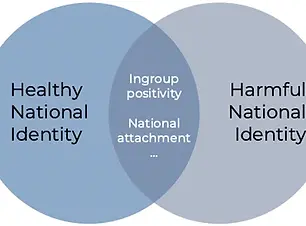.png)
POST-DOC
PHILIP PARNAMETS - NYU Social Psychology Postdoctoral Fellow
Philip completed his PhD in cognitive science at Lund University and has spent two years as a postdoc with the Emotion Lab at Karolinska Institutet. His research is grounded in a broad interest in the cognitive and computational mechanisms underlying preference change, decision making and learning, especially in the moral domain. In the Social Identity and Morality lab his work focuses on dynamic models of social learning about moral agents and of moral choices generally. Philip spends his spare time creating, listening or dancing to electronic music.

Recent posts:

Each day, we scroll through roughly 300 feet of social media content—that is equivalent to the height of the Statue of Liberty! This constant engagement is not just habitual; it fundamentally alters our identities and realities. Social media holds a fun-house mirror up to society, distorting our perceptions of reality, and the incentives and engagement structures of social media put us in constant conflict with one another.

Have you ever wondered how academics like us manage to put together invited talks, publish papers, or secure funding? This week, we put together advice that should be helpful for a broad audience on giving great presentations, writing efficiently, goal setting, saying “no”, managing conflict, and mentoring, as well as specific advice for each academic career stage including applying to graduate school, negotiating a job offer, and running a lab.

The night of March 13, 1964, marked one of the darkest moments in the history of New York and the beginning of a myth that shaped how people saw the city—as well as human psychology—for decades. For more than half an hour, 38 respectable citizens in Queens watched a killer stalk and stab a young woman named Kitty Genovese in three separate attacks in Kew Gardens.

We write a lot about cooperation & team performance, but talk is cheap. It is easier than ever to talk about how your team or organizational culture is excellent. There is an endless stream of this type of commentary on podcasts, social media, and conference stages.
But what really matters is how a team actually performs.
.webp)
For many Americans, July 4th is a day of fireworks, barbecue, and flags rippling in the wind—a day of shared national pride. But as that pride has waned in recent years, it’s also a time to ask: What does it mean to be proud of one's country? Today’s newsletter unpacks healthy and harmful forms of national identification and how they shape the world in profoundly different ways.

It often feels as if the world is falling apart. In the past few years, we have faced a global pandemic, record high global temperatures, serious threats to democracy, and the rise of frightening technology — including social media and artificial intelligence. It is not surprising that people are burned out from existential panic.






